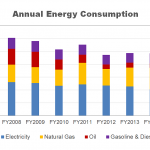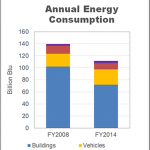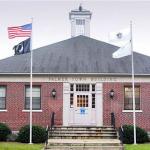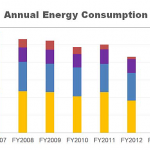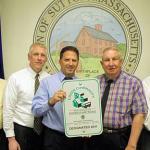Green Communities
"We think about energy efficiency in everything we do." - Mike Gibbons, Facilities Engineer, Springfield, MA
The DOER Green Communities Division strives to help all 351 Massachusetts cities and towns find clean energy solutions that reduce long-term energy costs and strengthen local economies. The division provides technical assistance and financial support for municipal initiatives to improve energy efficiency and increase the use of renewable energy in public buildings, facilities and schools.
One of the five criteria to earn designation as a Green Community is to develop a plan to reduce municipal energy use by 20%. Below are case studies we developed on the seven cities and towns that achieved the 20% reduction by 2015.
Learn how we support Green Communities in working toward their energy reduction goals on our Municipal Services page.
The Town of Arlington, located six miles northwest of Boston, has a longstanding commitment to sustainability. In 2000, the Board of Selectmen pledged to develop a climate action plan and reduce the town’s contribution to climate change with their vote to join Cities for Climate Protection. Town Meeting adopted the Arlington Sustainability Action Plan in 2006.
Several years ago, Belchertown, located in western Massachusetts bordering the Quabbin Reservoir, was struggling to meet budgets due to rising energy costs for municipal facilities. When the Green Communities program began, the town saw an opportunity to receive support for energy efficiency projects that would help to control operating costs.
The City of Cambridge has a longstanding commitment to sustainability and to leading by example by improving the sustainability of municipal operations. Cambridge joined ICLEI’s Cities for Climate Protection in 1999.
The Town of Natick, located 18 miles west of Boston, has been a leader in energy efficiency for more than a decade. In 2004, Natick joined ICLEI Local Governments for Sustainability, which required the town to establish a baseline greenhouse gas emissions inventory and set reduction goals.
A few years before the Green Communities program began, the town of Palmer, located in the Pioneer Valley in western Massachusetts, participated in a program that offered free energy audits of their municipal facilities.
Springfield, the largest city in western Massachusetts, began an effort to increase its energy efficiency in 2007 because Patrick Sullivan, the city’s Executive Director of Parks, Buildings and Recreation Management, saw an opportunity to make improvements to aging facilities that would reduce energy consumption and operating costs.
In 2008, Selectman Michael Chizy set a goal to reduce energy consumption and pursue renewable energy options in Sutton, a town on Route 146 in the Blackstone Valley.


